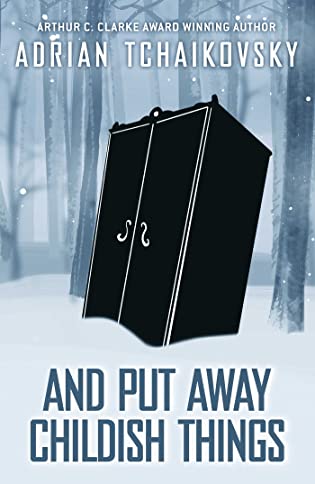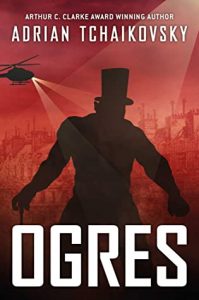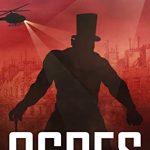 And Put Away Childish Things by Adrian Tchaikovsky
And Put Away Childish Things by Adrian Tchaikovsky Format: eARC
Source: supplied by publisher via NetGalley
Formats available: hardcover, ebook
Genres: fantasy, horror, portal fantasy, science fiction
Pages: 208
Published by Solaris on March 28, 2023
Purchasing Info: Author's Website, Publisher's Website, Amazon, Barnes & Noble, Kobo, Bookshop.org, Better World Books
Goodreads
Harry Bodie’s been called into the delightful fantasy world of his grandmother’s beloved children’s books. It’s not delightful here at all.
All roads lead to Underhill, where it’s always winter, and never nice.
Harry Bodie has a famous grandmother, who wrote beloved children’s books set in the delightful world of Underhill. Harry himself is a failing kids’ TV presenter whose every attempt to advance his career ends in self-sabotage. His family history seems to be nothing but an impediment.
An impediment... or worse. What if Underhill is real? What if it has been waiting decades for a promised child to visit? What if it isn’t delightful at all? And what if its denizens have run out of patience and are taking matters into their own hands?
My Review:
If the title of this book sounds familiar, it’s because it’s from the New Testament quote from Chapter 13 of I Corinthians below. But as much as the first line is directly referenced in the title, the second line is every single bit as applicable to this story and the way that it all works out.
“When I was a child, I spoke as a child, I understood as a child, I thought as a child: but when I became a man, I put away childish things. For now we see through a glass, darkly; but then face to face: now I know in part; but then shall I know even as also I am known.”
The first question the story raises is “who decides?” Who decides what a childish thing is and when we should put it away. The second revolves around what it takes to truly be known, by oneself as well as by others.
Because as the story opens, Felix “call me Harry” Bodie doesn’t know himself or where he came from very much at all. And honestly doesn’t seem to want to. What he wants is to hide himself behind the mask of a working – if barely – actor and bury his past as the grandson of a famous juvenile fantasy author.
His grandmother, Mary Bodie, was the author of the Underhill books, a story and a world not all that different from Narnia. Or at least a Narnia without Aslan and the overt Christian allegory that seemed to exude from the lion’s mane.
Underhill was a place with quirky, intelligent animals and not too perilous dangers just perfect for a pair of young human scamps to slip into for adventures. Harry is more than happy to cash the decreasing royalty checks that still drop into his accounts and forget the rest. Or so he believes.
It’s only when he takes a rather desperate chance on a spot in the British equivalent of the Finding Your Roots program that he learns that Grandma Mary was born in an insane asylum to a woman who claimed to come from fairyland, and that she told her daughter all about it. It’s those stories that became the roots of the Underhill series.
The revelation of his great grandmother’s insanity draws the most rabid side of the still-active Underhill fandom out into the light of day – just as the real-world pandemic is about to drive everyone, everywhere under quarantine.
The world is going insane, and Harry is all too afraid he’s going with it. Especially when he starts seeing a diseased, desiccated version of Underhill’s resident trickster faun in the alleys behind his apartment – while a woman who claims to be a private investigator stalks him on the street.
Together they drive Harry straight out of this world and down into Underhill, which is rather more real than he ever imagined. And considerably more dangerous than his grandmother’s books EVER led him to expect.
Escape Rating B+: The thing about this book, at least for the first half of it, is Harry. And it’s not exactly a good thing, because Harry himself isn’t exactly a good thing. Nor does he have a good thing. Nor does he believe he has or is a good thing. Harry’s a bit ‘meh’ at best, pretty much all the way down to the bone. He doesn’t like himself, he doesn’t like his life, he isn’t going anywhere and he thinks nobody likes him because he honestly works at not being likable. He’s no fun to be with, not as a character and not even for himself.
So the beginning of the story is a bit rough because we don’t care about Harry – because he doesn’t even care about himself. At least not until he goes through a wardrobe, even though that’s the other fantasy series, and finds himself in Underhill. Or what’s left of it.
The place is dying and diseased and scabrous and NOTHING like the books. But for once in his life Harry is not being paranoid – everything left in Underhill really is out to get him. Or at least to find him.
Because he’s the heir to the entire blighted mess. Whether he wants to be or not. It’s the first time he’s been important in his whole, entire life. So he decides to seize the day – or at least the creepy twilight that is all that’s left in Underhill.
Only to discover that being the heir to the place isn’t remotely what he thought it might be. But then again, nothing and no one in this adventure has turned out to be anything like he expected. Not even, in the end, himself.
And that’s where things get interesting. At last. One way or another.
While it’s the off-kilter resemblance to Narnia that initially hooks the reader, it’s the subversions of any and all expectations – about Harry, about Underhill, about pretty much everyone and everything he’s met along the way – that give the story its, well, everything.
Initially, I thought this was going to be a bit like Lev Grossman’s The Magicians, which is also a play on Narnia. But The Magicians plays it more or less straight, turning Fillory into a version of Narnia that, while still fantastic, doesn’t mess with religious allegory and simply turns into an adult version of Narnia with a heaping helping of dark academia on top.
 Instead, And Put Away Childish Things mixes the central theme of Never Too Old to Save the World with Carrie Vaughn’s Questland, and Tchaikovsky’s own Ogres to create a story about being called to save a portal fantasy world in midlife only to learn that the whole setup is SFnal and not fantasy after all, and that the person who can really save the place – or at least its heart – is the folklorist who everyone believed was just hanging on to prove her weird theories about literature that so-called “true academics” have discounted as either childish or merely unimportant and uninteresting to “real scholars”.
Instead, And Put Away Childish Things mixes the central theme of Never Too Old to Save the World with Carrie Vaughn’s Questland, and Tchaikovsky’s own Ogres to create a story about being called to save a portal fantasy world in midlife only to learn that the whole setup is SFnal and not fantasy after all, and that the person who can really save the place – or at least its heart – is the folklorist who everyone believed was just hanging on to prove her weird theories about literature that so-called “true academics” have discounted as either childish or merely unimportant and uninteresting to “real scholars”.
At the end, the seemingly childish things turn out to be not so childish after all, and Harry is known, to himself and to others, in a way that he never would have let himself be or even feel in the so-called real world. And it’s the making of him and the making of the story – even though – or perhaps especially because – he turns out not to be the true hero of after all. Although a hero he certainly becomes.




















